
- Average Rating:
- Not yet rated
- Topic Areas:
- Short Courses | Anxiety | Children and Adolescent Therapy | Ericksonian Hypnosis and Therapy Techniques
- Categories:
- Erickson Congress | Erickson Congress 2007
- Faculty:
- Lynn Lyons, LICSW
- Duration:
- 1:19:39
- Format:
- Audio Only
- Original Program Date:
- Dec 07, 2007
- Short Description:
- Excessive anxiety in childhood is a significant predictor of eventual comorbid depression and other conditions. This presentation will identify the cognitive processes and coping strategies that help create a cycle of anxiety, psychological isolation and depression in anxious children and families. Attention will be given to the development of specific, empirically supported Ericksonian strategies which can help shift the anxious individual and family toward malleability, creativity and adaptability.
- Price:
- $15.00 - Base Price

- Average Rating:
- Not yet rated
- Topic Areas:
- Short Courses | Ericksonian Hypnosis and Therapy Techniques | Hypnosis | Utilization | Children and Adolescent Therapy | Trance
- Categories:
- Erickson Congress | Erickson Congress 2007
- Faculty:
- Peg LeBlanc, MA
- Duration:
- 1:19:27
- Format:
- Audio Only
- Original Program Date:
- Dec 07, 2007
- Short Description:
- Children and their families face many challenges that, depending on how they are managed, will have long-lasting influence either for better or worse. In this presentation, we will focus on some of these challenges and will describe some helpful interventions derived from Ericksonian approaches that have been successfully applied in a multicultural school setting.
- Price:
- $15.00 - Base Price

- Average Rating:
- Not yet rated
- Topic Areas:
- Short Courses | Children and Adolescent Therapy | Humor | Therapeutic Relationship
- Categories:
- Erickson Congress | Erickson Congress 2007
- Faculty:
- Bruce L.M. Tanenbaum, MD
- Duration:
- 1:06:04
- Format:
- Audio Only
- Original Program Date:
- Dec 07, 2007
- Short Description:
- Underachieving adolescents present a significant challenge to the therapist. Traditional therapies are often slow and may be ineffective and frustrating both to the therapist and the client. Provocative Therapy is an active humor-based therapy that often elicits significant changes quickly. Case studies will help illustrate principles and techniques therapist can use with adolescents and other client who may present a challenge.
- Price:
- $15.00 - Base Price
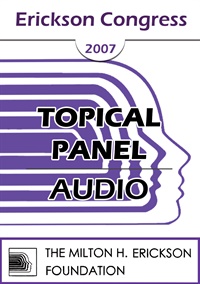
- Average Rating:
- Not yet rated
- Topic Areas:
- Topical Panels | Children and Adolescent Therapy
- Categories:
- Erickson Congress | Erickson Congress 2007
- Faculty:
- Danie Beaulieu, PhD | Maria Escalante de Smith, MA | John Edgette, PsyD | Susy Signer-Fischer, Lic. Phil. Psych
- Duration:
- 59:08
- Format:
- Audio Only
- Original Program Date:
- Dec 08, 2007
- Short Description:
- IC07 Topical Panel 10 - Therapy with Children & Adolescents - Danie Beaulieu, Ph.D., Maria Escalante Cortina, D.D.S., John Edgette, Psy.D., Susy Signer-Fischer, Lic. Phil.
- Price:
- $15.00 - Base Price
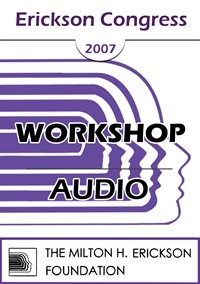
- Average Rating:
- Not yet rated
- Topic Areas:
- Workshops | Addiction | Children and Adolescent Therapy | Depression | Eating Disorders | Ericksonian Hypnosis and Therapy Techniques | Hypnosis | Metaphors | Phobia | Trauma | Trance
- Categories:
- Erickson Congress | Erickson Congress 2007
- Faculty:
- Cheryl Bell-Gadsby, M.A., R.C.C.
- Duration:
- 1:54:20
- Format:
- Audio Only
- Original Program Date:
- Dec 07, 2007
- Short Description:
- This workshop will provide participants with innovative and supportive strength-based interventions to address the unique impact of violence and trauma on adolescent girls. A model for applying Ericksonian hypnosis and metaphor will be presented and practiced. These techniques can be used to facilitate clients in reconnecting to a healthy mind/body state by applying tools for understanding and working with the expressions of trauma such as disordered eating, suicidal ideation, self-harming, addiction, depression, anxiety and phobias in the daily lives and relationships of young women.
- Price:
- $15.00 - Base Price
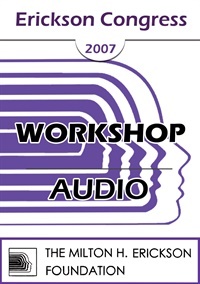
- Average Rating:
- Not yet rated
- Topic Areas:
- Workshops | Children and Adolescent Therapy | Tailoring | Strategic Therapy
- Categories:
- Erickson Congress | Erickson Congress 2007
- Faculty:
- Janet Sasson Edgette, PsyD
- Duration:
- 1:52:06
- Format:
- Audio Only
- Original Program Date:
- Dec 07, 2007
- Short Description:
- Few therapy approaches were designed specifically with adolescents in mind. Teenagers often describe therapy as irrelevant and boring. This approach replaces an emphasis on feelings, confidentiality, and non-judgmental support with a focus on therapist credibility, client accountability, and un-affected conversation – factors that are more affecting to these kids, many of whom never asked for our help in the first place. Participants learn how to establish themselves as credible figures to their teen clients, boldly hold those clients accountable for their choices, and build compelling conversations sentence by sentence that have genuine meaning and striking impact.
- Price:
- $15.00 - Base Price

- Average Rating:
- Not yet rated
- Topic Areas:
- Workshops | Children and Adolescent Therapy | Psychotherapy | Anxiety | Hypnosis | Post-Traumatic Stress Disorder (PTSD) | Self-Esteem
- Categories:
- Erickson Congress | Erickson Congress 2007
- Faculty:
- Susy Signer-Fischer, Lic. Phil. Psych
- Duration:
- 1:53:27
- Format:
- Audio Only
- Original Program Date:
- Dec 07, 2007
- Short Description:
- Self-esteem, self-confidence and self-concept are closely connected with the development of human identity. The enhancement of self-esteem and identity formation can be used effectively in psychotherapy with children, especially in the treatment of anxiety disorders, depression, post-traumatic stress disorder and many other social difficulties. Hypnotic interventions proved to be effective in working with children and adolescents on an individual basis.
- Price:
- $15.00 - Base Price
Tags: Anxiety Hypnosis PTSD Self-Esteem
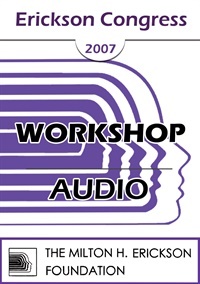
- Average Rating:
- Not yet rated
- Topic Areas:
- Workshops | Storytelling | StoryPlay | Children and Adolescent Therapy | Metaphors | Multicultural
- Categories:
- Erickson Congress | Erickson Congress 2007
- Faculty:
- Joyce Mills, PhD, LMFT
- Duration:
- 1:42:09
- Format:
- Audio Only
- Original Program Date:
- Dec 09, 2007
- Short Description:
- The StoryPlay® model weaves together the elements of story/metaphors, creativity, expressive arts and play to form a unique and proven method of therapy to effect positive change, healing and problem-solving. Deriving its theoretical foundations from the principles of Milton H. Erickson and indigenous teachings, StoryPlay® emphasizes cultural diversity, natural healing abilities and creative solutions.
- Price:
- $15.00 - Base Price
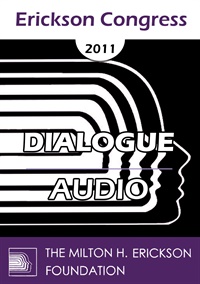
- Average Rating:
- Not yet rated
- Topic Areas:
- Dialogues | Children and Adolescent Therapy
- Categories:
- Erickson Congress | Erickson Congress 2011
- Faculty:
- Lynn Lyons, LICSW | Joyce Mills, PhD, LMFT | Susy Signer-Fischer, Lic. Phil. Psych
- Duration:
- 1:00:16
- Format:
- Audio Only
- Original Program Date:
- Dec 10, 2011
- Short Description:
- IC11 Dialogue 14 – Children and Adolescents – Lynn Lyons, MSW, Joyce Mills, PHD, LMFT, and Susy Signer-Fischer, Lic. Phil
- Price:
- $15.00 - Base Price
Tags: Adolescents Children
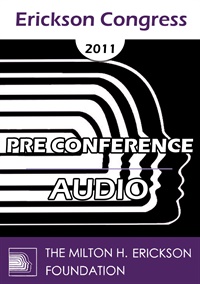
- Average Rating:
- Not yet rated
- Topic Areas:
- StoryPlay | Pre-Conference Sessions | Storytelling | Children and Adolescent Therapy
- Categories:
- Erickson Congress | Erickson Congress 2011
- Faculty:
- Joyce Mills, PhD, LMFT
- Duration:
- 4:00:54
- Format:
- Audio Only
- Original Program Date:
- Dec 08, 2011
- Short Description:
- With the healing power of therapeutic metaphors and the neuro-importance of play at its center, Story-Play®, a new Ericksonian, resiliency-based “indirective” model of play therapy provides participants with hands-on, creative tools for working with children and adolescents who experience phobias, medical issues, abuse, and trauma in a variety of settings to include private practice, hospitals, and the classroom. Case examples and experiential exercises will highlight how StoryPlay® can be effectively utilized with specialized populations or situations. Part I will focus upon the foundations of StoryPlay® Roots, Nine Essential Elements, Therapeutic Metamorphosis - four passages to transformation, and Steps for Creating and Utilizing Storytelling Metaphors both real and made-up. Multi-cultural aspects, Nature as co-storyteller, and relaxation exercises will be integrated. The second part will show how to recognize, retrieve and utilize “blocked sensory resources” to achieve...
- Price:
- $15.00 - Base Price
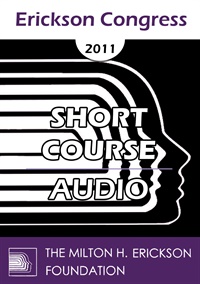
- Average Rating:
- Not yet rated
- Topic Areas:
- Short Courses | Children and Adolescent Therapy | Family Therapy | Strengths-Based
- Categories:
- Erickson Congress | Erickson Congress 2011
- Faculty:
- Bob Bertolino, PhD
- Duration:
- 1:28:56
- Format:
- Audio Only
- Original Program Date:
- Dec 09, 2011
- Short Description:
- A Strengths-Based Therapy approach provides practitioners with essential principles and practices for improving effectiveness and outcomes with adolescents and families. Participants in this work-shop will be introduced to current research findings on effective practice and will learn key strategies to strengthen the therapeutic relationship and alliance, maximize client contributions to change, and respond efficiently to client progress. The strategies offered can be applied to a wide range of settings with a continuum of concerns.
- Price:
- $15.00 - Base Price
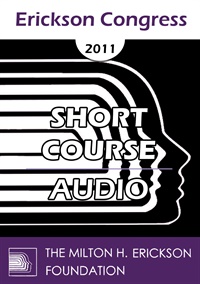
- Average Rating:
- Not yet rated
- Topic Areas:
- Hypnotherapy | Short Courses | Children and Adolescent Therapy | Strategic Therapy | Hypnotic Induction | Utilization
- Categories:
- Erickson Congress | Erickson Congress 2011
- Faculty:
- Tobi Goldfus, LCSW
- Duration:
- 1:16:20
- Format:
- Audio Only
- Original Program Date:
- Dec 09, 2011
- Short Description:
- With a plugged-in 24/7 cyberspace that demands instantaneous response of internet and social networking, many young people have difficulty with self-regulation and modulation. This workshop pro-poses a tailored strategic approach toward utilizing the natural creativity and novelty that young people have embedded in their developmental make-up to combat this impulsivity or limited access to inner resources. Experiential and specific ways to elicit responsiveness will be explored.
- Price:
- $15.00 - Base Price
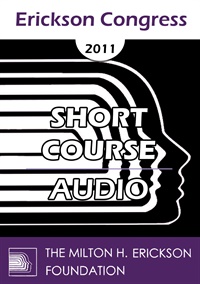
- Average Rating:
- Not yet rated
- Topic Areas:
- Short Courses | Children and Adolescent Therapy | Ericksonian Hypnosis and Therapy Techniques
- Categories:
- Erickson Congress | Erickson Congress 2011
- Faculty:
- Carme Timoneda-Gallart
- Duration:
- 1:08:47
- Format:
- Audio Only
- Original Program Date:
- Dec 09, 2011
- Short Description:
- The aim of this short course is to present the therapeutic work developed with children affected by learning difficulties. A cartoon video created to make children aware of their own learning processes will be presented. As the majority of learning difficulty cases are a clear emotional component, some very effective Ericksonian resources will be exemplified with several practical cases.
- Price:
- $15.00 - Base Price
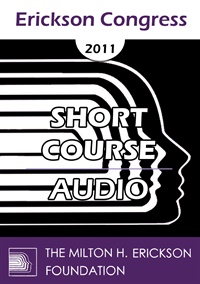
- Average Rating:
- Not yet rated
- Topic Areas:
- Short Courses | Brief Therapy | Children and Adolescent Therapy | Language of Hypnosis | Ericksonian Hypnosis and Therapy Techniques | Metaphors | Utilization
- Categories:
- Erickson Congress | Erickson Congress 2011
- Faculty:
- Marilyn Wedge
- Duration:
- 1:00:05
- Format:
- Audio Only
- Original Program Date:
- Dec 09, 2011
- Short Description:
- The language a therapist uses to conceptualize and treat a problem determines whether or not that problem can be resolved effectively. This workshop introduces a new model, child-focused family therapy, which is a respectful and effective technique for treating severe problems of children. This method includes a precisely worded opening question, a strategic dialogue with parents and children, Erickson’s principle of utilization, and the use of metaphor to open up solutions.
- Price:
- $15.00 - Base Price
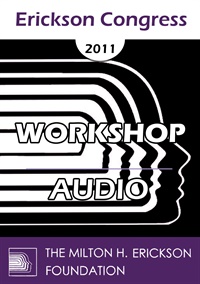
- Average Rating:
- Not yet rated
- Topic Areas:
- Children and Adolescent Therapy | Workshops | Hypnosis | Self-Esteem
- Categories:
- Erickson Congress | Erickson Congress 2011
- Faculty:
- Susy Signer-Fischer, Lic. Phil. Psych
- Duration:
- 59 Minutes
- Format:
- Audio Only
- Original Program Date:
- Dec 07, 2011
- Short Description:
- Self-esteem, self-confidence and self-concept are concepts closely connected with the development of human identity. The enhancement of self-esteem and identity formation can be used effectively in psychotherapy with children, especially in the treatment of anxiety disorders, depression, post-traumatic stress disorder and many other social difficulties. Hypnotic interventions proved to be effective in working with children and adolescents on an individual basis.
- Price:
- $20.00 - Base Price
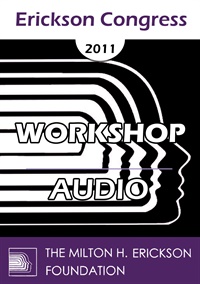
- Average Rating:
- Not yet rated
- Topic Areas:
- Trauma | StoryPlay | Workshops | Children and Adolescent Therapy | Metaphors | Storytelling | Art and Creativity
- Categories:
- Erickson Congress | Erickson Congress 2011
- Faculty:
- Joyce Mills, PhD, LMFT
- Duration:
- 59 Minutes
- Format:
- Audio Only
- Original Program Date:
- Dec 07, 2011
- Short Description:
- With the neuro-healing power of metaphor, creativity and play at its center, this experiential training presents StoryPlay® ; an Ericksonian, resiliency-based, indirective process that interweaves cultural diversity and natural healing abilities, to effect transformational change for children and adolescents who have experienced trauma and adversity.
- Price:
- $20.00 - Base Price
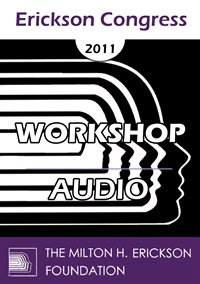
- Average Rating:
- Not yet rated
- Topic Areas:
- Anxiety | Workshops | Children and Adolescent Therapy
- Categories:
- Erickson Congress | Erickson Congress 2011
- Faculty:
- Lynn Lyons, LICSW
- Duration:
- 59 Minutes
- Format:
- Audio Only
- Original Program Date:
- Dec 07, 2011
- Short Description:
- Families dealing with an anxious child often unknowingly “help” their child by doing the very things that make anxiety stronger. This workshop will give clinicians strategies that, from the very first session, show parents and children how to identify and interrupt the cognitive, behavioral, and physiological patterns of anxiety in children.
- Price:
- $20.00 - Base Price
Tags: Adolescents Anxiety Children
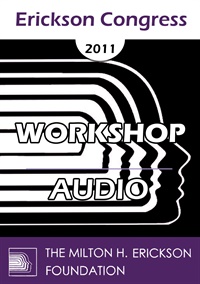
- Average Rating:
- Not yet rated
- Topic Areas:
- Workshops | Children and Adolescent Therapy | Ericksonian Hypnosis and Therapy Techniques | Brief Therapy | Hypnotherapy | Psychosomatics
- Categories:
- Erickson Congress | Erickson Congress 2011
- Faculty:
- Charlotte Wirl
- Duration:
- 59 Minutes
- Format:
- Audio Only
- Original Program Date:
- Dec 07, 2011
- Short Description:
- Brief hypnotherapy is particularly suited for children and adolescents with psychosomatic disorders, be-cause it exploits their natural abilities to fall into trance and uses a language of symbols and metaphors. It is based on the Ericksonian belief in the abilities of a child and is astonishing in its effectiveness.
- Price:
- $20.00 - Base Price
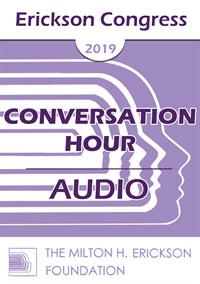
- Average Rating:
- Not yet rated
- Topic Areas:
- Conversation Hours | Anxiety | Children and Adolescent Therapy
- Categories:
- Erickson Congress | Erickson Congress 2019
- Faculty:
- Lynn Lyons, LICSW
- Duration:
- 1 Hour
- Format:
- Audio Only
- Original Program Date:
- Dec 14, 2019
- Short Description:
- Many clinicians focus on breathing, calming, or other distraction techniques when dealing with anxious children. However, focusing on "getting rid of the worry" often backfires, and leaves children and teens feeling more hopeless than engaged. But, when we use short "relaxation" practices with children to shift their patterns and beliefs--when we use this time of focus to deliver and seed valuable information--we create great opportunities for change, engagement, and skill-building. In this hour, I'll describe the tricks to getting the most out these exercises, without stepping into the trap of elimination.
- Price:
- $15.00 - Base Price
Tags: Adolescents Anxiety Children
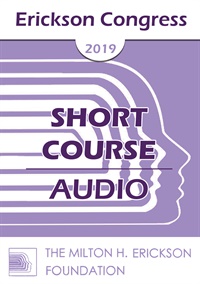
- Average Rating:
- Not yet rated
- Topic Areas:
- Short Courses | Anxiety | Depression | Ericksonian Hypnosis and Therapy Techniques | Children and Adolescent Therapy | Eye Movement Desensitization and Reprocessing (EMDR) | Hypnosis | Cognitive Behavior Therapy (CBT)
- Categories:
- Erickson Congress | Erickson Congress 2019
- Faculty:
- Joseph Sestito, MSSA, LISW-S
- Duration:
- 1 Hour 33 Minutes
- Format:
- Audio Only
- Original Program Date:
- Dec 12, 2019
- Short Description:
- The first factor that is of central importance is developing a strong therapeutic alliance with the client, mainly through empathically relating to him/her. Second, it will be shown how to guide adolescents and younger children to identify the specific Activating Event (AE) that is bringing about their unhealthy negative emotions through triggering self-defeating cognition(s).
- Price:
- $15.00 - Base Price
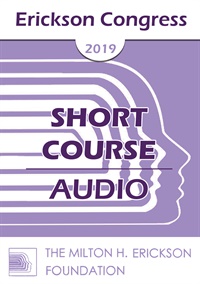
- Average Rating:
- Not yet rated
- Topic Areas:
- Short Courses | Children and Adolescent Therapy | Ericksonian Psychotherapy | Psychotherapy | Ericksonian Hypnosis and Therapy Techniques | Family Therapy
- Categories:
- Erickson Congress | Erickson Congress 2019
- Faculty:
- Maria Escalante de Smith, MA
- Duration:
- 1 Hour
- Format:
- Audio Only
- Original Program Date:
- Dec 12, 2019
- Short Description:
- Ericksonian Psychotherapy emphasizes the importance of utilization. When treating children, as therapists, we need to keep in mind that we also need to utilize whatever happens during therapy whether that can be a given behavior, if the child brings a toy for the consultation, their likes and also provide them with a wide array of resources they can access during therapy.
- Price:
- $15.00 - Base Price
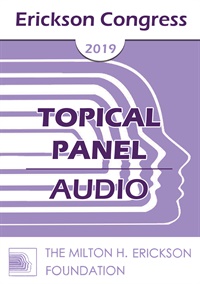
- Average Rating:
- Not yet rated
- Topic Areas:
- Topical Panels | Children and Adolescent Therapy
- Categories:
- Erickson Congress | Erickson Congress 2019
- Faculty:
- Tobi Goldfus, LCSW | Lynn Lyons, LICSW | Joyce Mills, PhD, LMFT | Susy Signer-Fischer, Lic. Phil. Psych
- Duration:
- 1 Hour 3 Minutes
- Format:
- Audio Only
- Original Program Date:
- Dec 13, 2019
- Short Description:
- The panelist will compare and contrast their approaches to working with children and adolescents. Fundamental principles will be offered. Relevant research will be outlined.
- Price:
- $15.00 - Base Price
Tags: Adolescents Children
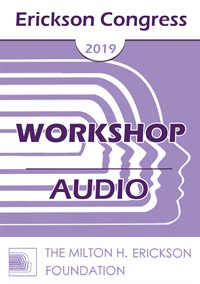
- Average Rating:
- Not yet rated
- Topic Areas:
- Workshops | Children and Adolescent Therapy | Hypnosis
- Categories:
- Erickson Congress | Erickson Congress 2019
- Faculty:
- Susy Signer-Fischer, Lic. Phil. Psych
- Duration:
- 1 Hour 58 Minutes
- Format:
- Audio Only
- Original Program Date:
- Dec 13, 2019
- Short Description:
- Self-efficacy is an essential topic throughout life. Even babies like to control their environment, for example by moving a mobile by a wire attached to their foot. During school years and later on self-efficacy is very important. The contrary is helplessness, the opposite, which can lead to hopelessness and depression. While in certain situations we are able to influence our environment (or processes) directly, such as learning harder in order to get better math marks, this is not always possible.
- Price:
- $15.00 - Base Price
Tags: Adolescents Children Hypnosis
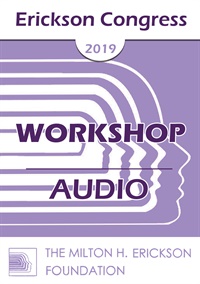
- Average Rating:
- Not yet rated
- Topic Areas:
- Workshops | Anxiety | Family Therapy | Homework | Children and Adolescent Therapy | Experiential Therapy
- Categories:
- Erickson Congress | Erickson Congress 2019
- Faculty:
- Lynn Lyons, LICSW
- Duration:
- 1 Hour 56 Minutes
- Format:
- Audio Only
- Original Program Date:
- Dec 13, 2019
- Short Description:
- After decades of working with anxious children and teens, I have two unshakable truths: families MUST be involved in treatment and anxious patterns are shifted through experiential learning. Working with the FOUR critical concepts to manage anxiety in families and the SIX patterns that must be interrupted, this workshop will describe HOW to create active, engaging assignments for families to do between sessions and describe the TEN favorites that I return to again and again.
- Price:
- $15.00 - Base Price
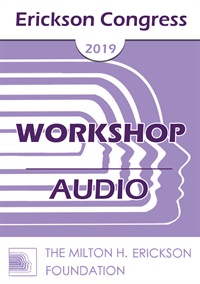
- Average Rating:
- Not yet rated
- Topic Areas:
- Workshops | Autism | Hypnosis | Children and Adolescent Therapy | Family Therapy | Communication
- Categories:
- Erickson Congress | Erickson Congress 2019
- Faculty:
- Laurence Sugarman, MD
- Duration:
- 1 Hour 38 Minutes
- Format:
- Audio Only
- Original Program Date:
- Dec 13, 2019
- Short Description:
- Hypnotic conversations explore, evoke, engage and reallocate and experiential resources. Having hypnotic conversations with young people who meet criteria for autism spectrum disorder (ASD), presents challenges both in relating and accessing resources. The challenge extends to helping their parents to better parent by seeing them as resourceful and capable.
- Price:
- $15.00 - Base Price

